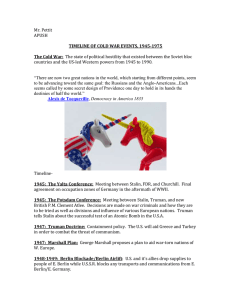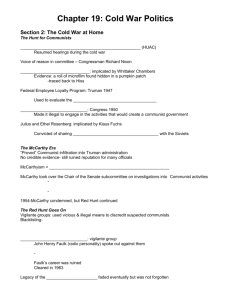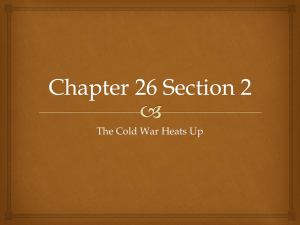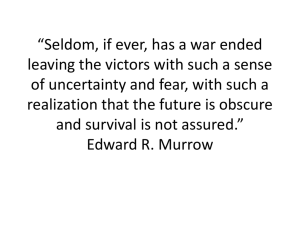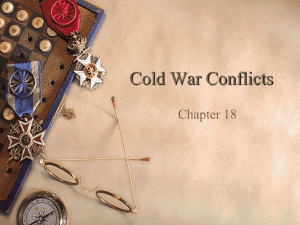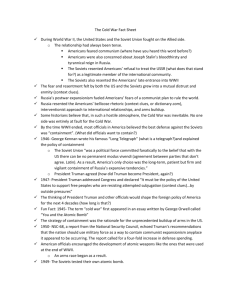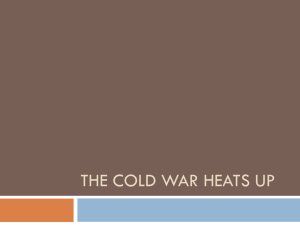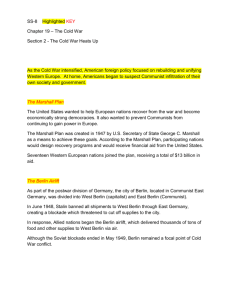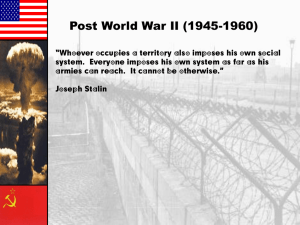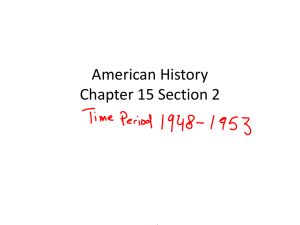COLD WAR TIMELINE
advertisement
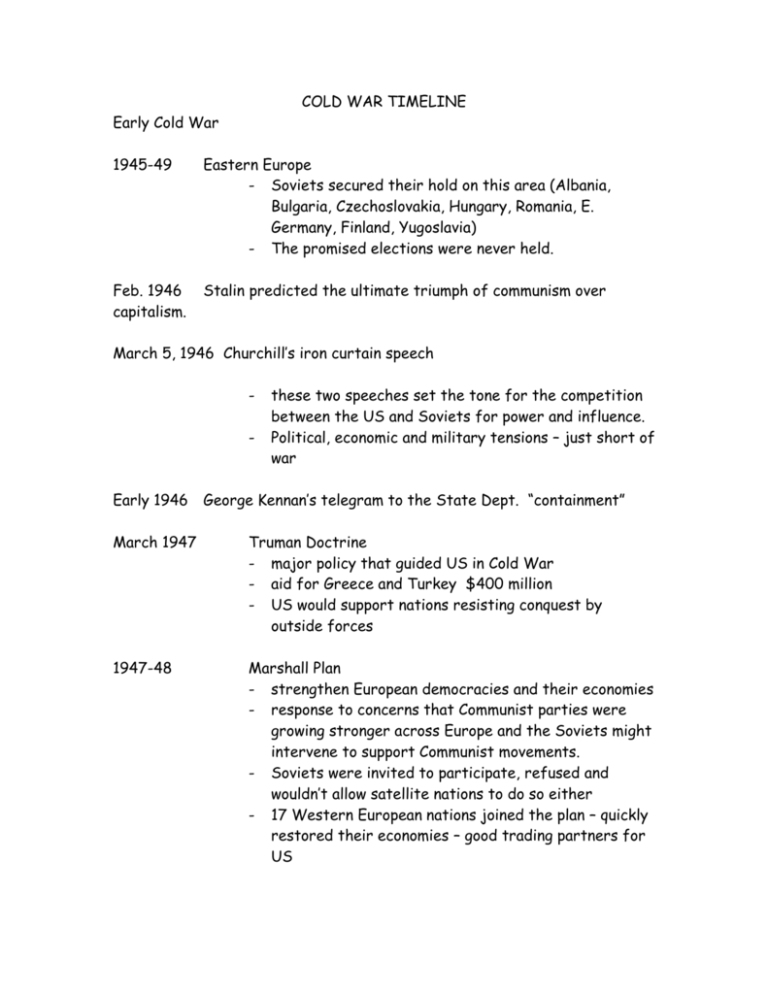
COLD WAR TIMELINE Early Cold War 1945-49 Eastern Europe - Soviets secured their hold on this area (Albania, Bulgaria, Czechoslovakia, Hungary, Romania, E. Germany, Finland, Yugoslavia) - The promised elections were never held. Feb. 1946 capitalism. Stalin predicted the ultimate triumph of communism over March 5, 1946 Churchill’s iron curtain speech - Early 1946 these two speeches set the tone for the competition between the US and Soviets for power and influence. Political, economic and military tensions – just short of war George Kennan’s telegram to the State Dept. “containment” March 1947 Truman Doctrine - major policy that guided US in Cold War - aid for Greece and Turkey $400 million - US would support nations resisting conquest by outside forces 1947-48 Marshall Plan - strengthen European democracies and their economies - response to concerns that Communist parties were growing stronger across Europe and the Soviets might intervene to support Communist movements. - Soviets were invited to participate, refused and wouldn’t allow satellite nations to do so either - 17 Western European nations joined the plan – quickly restored their economies – good trading partners for US 1946 Truman’s Federal Employee Loyalty Program - investigation to keep communists out of federal government - FBI checked files for suspicious activities - Suspects went in front of a Loyalty Review Board - Not innocent until proven guilty! Once accused it was hard to clear your name. - House Un-American Activities Committee (HUAC) began a postwar probe of Communist infiltration of government agencies and Hollywood. Sept. – Oct. 1947 - - Hollywood Ten declined to answer the committee’s questions cited for contempt of Congress served jail terms from 6 months to a year March 1948 Western Allies announced plans to unite their zones in Germany to form one unit. (US, BR, FR) United their parts of Berlin too. 1948 Soviet response – formed a Communist state - German Democratic Republic (East Germany) ** visible symbols of the Cold War struggle June 1948 West Berlin - new German currency introduced in West Germany and - May 1949 September 1949 Stalin considered new currency and the new nation it represented to be a threat. Decided to block Allied access to West Berlin. Threatened to create severe shortages Truman decided to airlift supplies into West Berlin 15 months 13,000 tons of supplies - Soviets gave up the blockade - - airlift ended Berlin remained a focal point of East-West conflict April 1949 1949 - NATO - North Atlantic Treaty Organization - Armed attack on one is an attack on all - Collective security - US and Canada, Western Europe two events heightened American concerns about the Cold War – - - Soviets successfully tested an atomic bomb o Began to prepare for an attack – what to do if it happened o Air raid drills o Posters on how to survive a nuclear attack Communist forces took control of China o Struggle between Nationalists and Communists had been going on since the 1920s o Communist Mao Zedong o Nationalist Chiang Kai-shek (Jiang Jieshi) o Fight between them got started up again after WW II o US assisted Jiang o Early 1949, capital of Peking fell to Communists o Jiang withdrew to island of Taiwan o Continued as Republic of China – claimed to be the legitimate government o US supported this o UN seat went to Jiang and Republic of China 1950 - Truman gave approval to develop a hydrogen or thermonuclear bomb, more powerful than the atomic bomb. 1951 - Alger Hiss - went to prison for four years - convicted of lying to a federal grand jury that was investigating him for espionage - he was a high ranking State Dept. official - accused of being a Communist in the 1930s - he denied the charge accused of being a Soviet spy 1950 (several months later) Ethel and Julius Rosenberg - members of Communist party - accused of passing atomic secrets to the Soviets - convicted of espionage and executed in 1953. ** declassified info since the end of the Cold War has shown that both Hiss and Julius Rosenberg were guilty. Ethel Rosenberg probably did not know of her husband’s activities. June 1950 - KOREA - Communists in the North attacked the South 1952 - first successful test of thermonuclear bomb – put US back on top 1953 - McCarran-Walter Act - law reaffirmed the quota system for each country that had been established in 1924. - Discriminated against potential immigrants from Asia and from Southern and Central Europe. - Vetoed by Truman – said it was un-American - Congress passed it over his veto 1955 - - WARSAW PACT Soviet response to NATO Military alliance with its satellite nations in Eastern Europe
